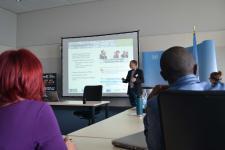UN-SPIDER supports and conducts projects that look at the use of space-based information for specific elements of risk and disaster management. UN-SPIDER’s projects aim to further promote universal access to all forms of space-based information to disaster risk management and emergency response to support the full disaster management cycle. Current projects UN-SPIDER takes part in are Earth Observation Based Information Products for Drought Risk Reduction at the National Level (EvIDENz) and Strengthening Early Warning Systems for Droughts in Latin America and the Caribbean (SEWS-D).
Spaceborne Earth Observation Applications for Emergency Response and Disaster Risk Reduction (SPEAR)
While an increasing number of African countries are developing space programmes, many countries on the continent do not have easy access to space-based information and and the knowledge of how to benefit from such data in the context of the context of disaster management and emergency response. The United Nations Office for Outer Space Affairs (UNOOSA), through its UN-SPIDER programme, and the Centre for Remote Sensing of Land Surfaces of the University of Bonn (ZFL) have launched the SPEAR project to understand needs, develop solutions and strengthen national capacities in using space-based information for disaster monitoring and prevention in Africa in line with international and regional frameworks.
Flood early warning systems using impact-based forecasts (Flood GUIDE)
UN-SPIDER is joining forces with partner in Europe, Ghana, Guatemala, Nigeria, Peru and South Africa to implement this pilot project to incorporate the routine use of impact-based forecasts in flood early warning systems in selected rivers.
Strengthening Early Warning Systems for Droughts in Latin America and the Caribbean (SEWS-D)
UN-SPIDER has brought together several international, regional and national partners as a way to promote the use of space-based information on the effects of drought on soils and vegetation, as a way to strengthen national drought early warning systems in Latin America and the Caribbean. The specific objectives of this project are to strengthen national drought policies based on the principles of integral risk reduction, and to enhance the capacity of ministries in agriculture and environment, civil protection agencies, meteorological observatories and other relevant institutions.
Earth Observation Based Information Products for Drought Risk Reduction at the National Level (EvIDENz)
UN-SPIDER is partnered with Centre for Remote Sensing of Land Surfaces (ZFL), University of Bonn, and the United Nations University Institute for Environment and Human Security (UNU-EHS) to carry out the EvIDENz project. EvIDENz develops and tests new Earth observation-based methods to monitor the drought hazard characteristics. The project focuses on the value adding from sensor data to information to knowledge to informed decision making and implementation. EvIDENz workshops have taken place in South Africa and Ukraine, which have also been used as case studies countries.

